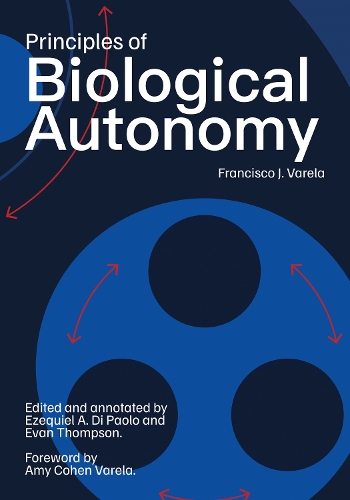
Principles of Biological Autonomy, a new annotated edition
(Paperback)
Publishing Details
Principles of Biological Autonomy, a new annotated edition
By (Author) Francisco J. Varela
By (author) Amy Cohen-Varela
MIT Press Ltd
MIT Press
17th June 2025
United States
Classifications
General
Non Fiction
570.1
Physical Properties
Paperback
400
Width 178mm, Height 254mm
Description
A new, updated edition of the 1979 classic from one of the foremost authors in cognitive science and theoretical biology, with the original text as well as more than 200 citations to current scientific developments. A new, updated edition of the 1979 classic from one of the foremost authors in cognitive science and theoretical biology, with the original text as well as more than 200 citations to current scientific developments. Francisco Varela's Principles of Biological Autonomy was a groundbreaking text when it was first published in 1979, putting forth a novel theory of how living systems produce and maintain themselves. This new edition, edited and annotated by cognitive scientists Ezequiel Di Paolo and Evan Thompson-revised and complemented with introductory essays for each part of the book-contains a wealth of ideas relevant to current projects in theoretical biology, cognitive science, systems theory, philosophy of mind, and philosophy of biology. Over 220 margin annotations supplement the reading of the text, linking to subsequent research and broader contemporary debates. This foundational book introduces the key concept of autonomy derived as an elaboration of the idea of autopoiesis (the self-production and self-distinction) of living organisms. Varela covers topics in systems theory, neuroscience, theories of perception, and immune networks, and offers a participatory epistemology that goes on to be further developed in later enactive literature. These ideas are compelling not only for historical reasons but also because they still illuminate current efforts in developing the enactive approach toward wider and more challenging goals (language, human cognition, ethics, environmentalism, etc.).
Author Bio
Evan Thompson is Professor of Philosophy at the University of British Columbia, where he is also Associate Member of the Department of Asian Studies and the Department of Psychology. He is a coauthor of The Embodied Mind and The Blind Spot (both MIT Press), and an elected fellow of the Royal Society of Canada and a past president of the Pacific Division of the American Philosophical Association. Francisco J. Varela (1946-2001) was Director of the Centre National de Recherche Scientifique, Professor of Cognitive Science and Epistemology, CREA, at the Ecole Polytechnique, Paris, and Cofounder of the Mind and Life Institute. Ezequiel A. Di Paolo is Ikerbasque Research Professor at the Basque Foundation for Science, Spain, and Visiting Research Fellow at the Centre for Computational Neuroscience and Robotics at the University of Sussex.
